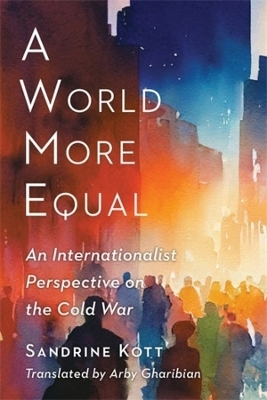
A World More Equal
An Internationalist Perspective on the Cold War
Seiten
2024
Columbia University Press (Verlag)
978-0-231-21014-0 (ISBN)
Columbia University Press (Verlag)
978-0-231-21014-0 (ISBN)
Diving into the archives of international organizations and associations, Sandrine Kott provides a new account of the Cold War that foregrounds the rise of internationalism as both an ideology and a practice.
The post–World War II period is typically seen as a time of stark division, an epochal global conflict between the United States and the Soviet Union. But beneath the surface, the postwar era witnessed a striking degree of international cooperation. The United Nations and its agencies, as well as regional organizations, international nongovernmental organizations, and private foundations brought together actors from conflicting worlds, fostering international collaboration across the geopolitical and ideological divisions of the Cold War.
Diving into the archives of these organizations and associations, Sandrine Kott provides a new account of the Cold War that foregrounds the rise of internationalism as both an ideology and a practice. She examines cooperation across boundaries in international spaces, emphasizing the role of midsized powers, including Eastern European and neutral countries. Kott highlights how the need to address global inequities became a central concern, as officials and experts argued that economic inequality imperiled the creation of a lasting peace. International organizations gave newly decolonized and “Third World” countries a platform to challenge the global distribution of power and wealth, and they encouraged transnational cooperation in causes such as human rights and women’s rights. Assessing the failure to achieve a new international economic order in the 1970s, Kott adds new perspective on the rise of neoliberalism. A truly global study of the Cold War through the lens of international organizations, A World More Equal also shows why the internationalism of this era offers resources for addressing social and global inequalities today.
The post–World War II period is typically seen as a time of stark division, an epochal global conflict between the United States and the Soviet Union. But beneath the surface, the postwar era witnessed a striking degree of international cooperation. The United Nations and its agencies, as well as regional organizations, international nongovernmental organizations, and private foundations brought together actors from conflicting worlds, fostering international collaboration across the geopolitical and ideological divisions of the Cold War.
Diving into the archives of these organizations and associations, Sandrine Kott provides a new account of the Cold War that foregrounds the rise of internationalism as both an ideology and a practice. She examines cooperation across boundaries in international spaces, emphasizing the role of midsized powers, including Eastern European and neutral countries. Kott highlights how the need to address global inequities became a central concern, as officials and experts argued that economic inequality imperiled the creation of a lasting peace. International organizations gave newly decolonized and “Third World” countries a platform to challenge the global distribution of power and wealth, and they encouraged transnational cooperation in causes such as human rights and women’s rights. Assessing the failure to achieve a new international economic order in the 1970s, Kott adds new perspective on the rise of neoliberalism. A truly global study of the Cold War through the lens of international organizations, A World More Equal also shows why the internationalism of this era offers resources for addressing social and global inequalities today.
Sandrine Kott is professor of modern European history at the University of Geneva and a visiting professor at New York University. Her books in English include Communism Day-to-Day: State Enterprises in East German Society (2014). Arby Gharibian is a French to English translator of academic and scientific works.
List of Acronyms
Acknowledgments
Introduction
1. The Two Parts of Europe During the Postwar Period
2. The Emergence of a “Second World”: Center and Periphery
3. Internationalisms During the Cold War
4. The Europe of Convergences
5. The Third World and the New International Economic Order
6. From Internationalisms to Globalism: The Slow Agony of the Cold War
Conclusion: Beyond the Cold War
Notes
Bibliography
Index
| Erscheinungsdatum | 15.12.2023 |
|---|---|
| Reihe/Serie | Columbia Studies in International and Global History |
| Übersetzer | Arby Gharibian |
| Verlagsort | New York |
| Sprache | englisch |
| Maße | 152 x 229 mm |
| Themenwelt | Geschichte ► Allgemeine Geschichte ► Zeitgeschichte |
| Sozialwissenschaften ► Politik / Verwaltung | |
| ISBN-10 | 0-231-21014-0 / 0231210140 |
| ISBN-13 | 978-0-231-21014-0 / 9780231210140 |
| Zustand | Neuware |
| Haben Sie eine Frage zum Produkt? |
Mehr entdecken
aus dem Bereich
aus dem Bereich
Gewalt, Umwelt, Identität, Methode
Buch | Softcover (2024)
Spector Books OHG (Verlag)
36,00 €
wie Freud im Kollektiv verschwand
Buch | Hardcover (2024)
Klett-Cotta (Verlag)
25,00 €


